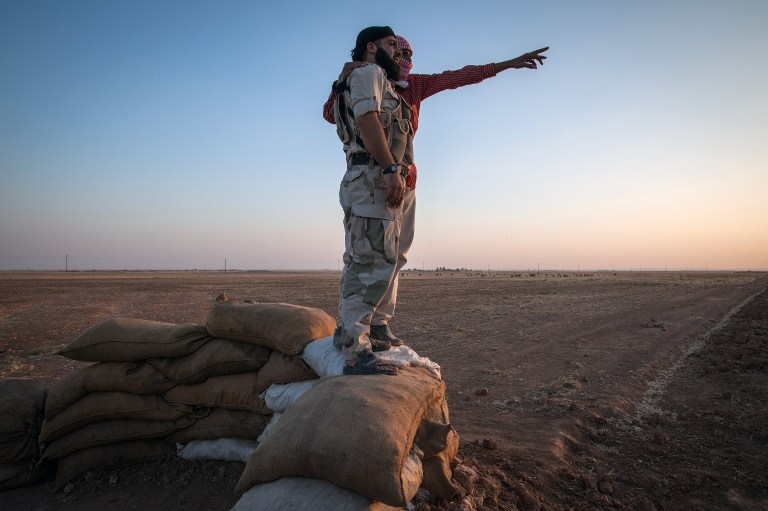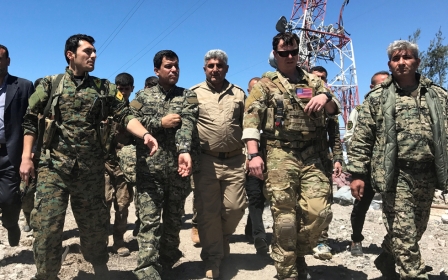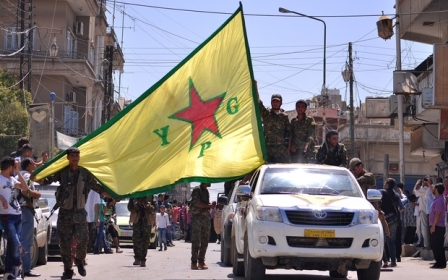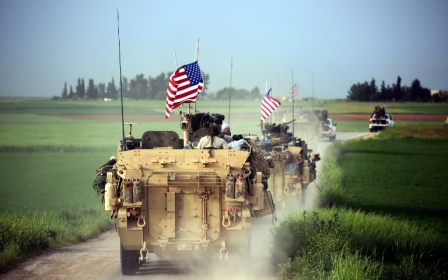The US joins the Turkey-PKK fight in northern Syria

With its 9 May announcement that it has decided to directly arm the Kurdish-dominated People’s Protection Units (YPG) in Syria, Washington has inserted itself even further into one of the region’s oldest and bloodiest conflicts: the 33-year-long fight between Turkey and the Kurdistan Workers’ Party (PKK), which is the mother organisation of the YPG and a group deemed a terrorist group by not only Turkey but by the US itself.
As sponsor to the YPG, the US is at least partly responsible for what may happen to Syria’s Kurds if and when the tide of the Syrian war turns against them
In fighting the Islamic State (IS), Washington has been supporting the YPG indirectly for several years and meeting with its commanders. But the decision to provide arms directly further elevates the PKK’s Syrian branch’s status. By doing so the US risks a deep, immediate rift with Turkey, its sometimes difficult but critical NATO partner of 60 years.
Playing sponsor to the YPG also means that the US is at least partly responsible for what may happen to Syria’s Kurds if and when the tide of the Syrian war turns against them. It would therefore do well to use its enhanced leverage to push its Kurdish partner to make the right choices.
For the US, any assessment should begin with a sober assessment of who the YPG is. US officials privately concede that the difference between the YPG and its civilian arm (the Party of Democratic Unity, or PYD) on the one hand and the PKK on the other amounts to little more than a useful fiction.
While the rank and file is mostly Syrian, the YPG’s upper command levels are heavily dominated by cadres trained in the PKK’s headquarters in northern Iraq and steeped in the party’s ideology.
Likewise, the idea that it would be possible to support the so-called Syrian Democratic Forces (SDF) in their advance against IS without simultaneously strengthening the YPG, who form the alliance’s core fighting force and top command, as previously claimed, has little bearing on reality.
Fateful choice
US support has enabled the SDF - and thus the YPG - to push way beyond the Kurdish-majority areas in Syria’s north-east. Working ever closer with the US-led international coalition against IS, the SDF is now closing in on Raqqa, the jihadist group’s unofficial capital. Y
Yet as it controls an ever-larger area, the YPG-PYD is rapidly approaching a fateful choice which Washington should seek to influence: whether to continue to back the PKK’s decades-old struggle with Turkey, or to devote its territorial gains and accumulated diplomatic credit to consolidating and protecting the status of de-facto self-rule it has achieved as a project in its own right.
Since 2012, the PKK and its Syrian affiliates have pursued a dual objective: improving their strategic position vis-a-vis Turkey by establishing a continuous militarised land belt along the Syria-Turkey border, and establishing what they refer to as “democratic self-administration” over the Kurdish and non-Kurdish communities that fell under their control.
Initially, those two objectives were mutually reinforcing: while the YPG-PYD worked to build “Rojava” (Kurdish for “West-Kurdistan”), the PKK exploited its affiliate’s gains to apply pressure on Turkey.
Yet this previously successful strategy of imposing facts on the ground and seizing territory under the cover of the anti-IS campaign has shown diminishing returns, and is now approaching a point where US military support today could leave the Kurdish militia dangerously exposed tomorrow.
Breaking point
Relentless territorial expansion means the YPG-PYD are now ruling over an ever-growing number of non-Kurdish communities, while the preoccupation with military matters has crippled their capacity to govern. Taking Raqqa, an overwhelmingly Arab city of 200,000, will likely stretch the governance model to breaking point.
Taking Raqqa, an overwhelmingly Arab city of 200,000, will likely stretch the YPG's governance model to breaking point
More critically still, Turkish hostility has increased along with the SDF/YPG’s military gains. While officially aimed at ISIS, Ankara’s incursion north of Aleppo in August 2016 was for the most part geared to stem the PKK’s westward advance toward Kurd-populated Afrin. In April 2017, Turkey went further and bombed the group’s positions in northern Syria and northern Iraq, not withstanding US objections.
For the moment, the YPG-PYD feels itself protected by the alliance with the US Indeed, Turkey’s persistent opposition to Washington’s cooperation with the YPG has yielded little of substance. That the US is “aware” of Turkish security concerns and would control the use of the weapons it hands out apparently has made make little impression in Ankara: “Every weapon provided to the YPG is a threat to Turkey", said Turkey's foreign minister, Mevlut Cavusoglu.
Yet once the YPG’s utility in fighting IS expires in the latter’s defeat, it is unclear whether the US will continue to devote resources to northern Syria, including post-IS stabilisation.
As a result, the YPG-PYD’s prospects could take a nosedive: trapped between a hostile Turkey to the north no longer hamstrung by the US and an opportunistic regime in Damascus waiting for the Kurdish areas to fall back in its lap, it will need new friends.
These are in short supply. Russia will almost certainly privilege its relationship with Damascus, and has shown itself unable to override a Turkish veto on the PYD’s participation in the Astana or Geneva talks.
The PKK needs to allow the YPG-PYD to think beyond its parent organisation’s decades-long fight against Turkey, and instead invest in sustainable governance in Syria
Iran, in turn, reportedly has been eyeing the YPG-controlled territories in Syria as an alternative supply route to its ally Hizbollah on the Mediterranean, but ultimately it remains committed to Syria’s territorial integrity and is therefore unlikely to support the YPG-PYD’s aspirations of regional autonomy.
This absence of a viable, long-term regional or international backer, and the pressure from hostile neighbours, makes the future of the PKK’s Syrian self-rule project uncertain. Between 2013-15, Ankara showed it might be willing to live with the PYD as a neighbour if the PKK were to suspend its fight and withdraw its militants, a position it would do well to restate.
Although the environment has changed a lot since then, it is conceivable that if Turkey’s main strategic concern – a PKK affiliate geared for military confrontation along its southern border – is addressed, Ankara might be willing to give regional autonomy in north-east Syria space to exist.
Risk of chaos
For this to happen, the PKK needs to allow the YPG-PYD to think beyond its parent organisation’s decades-long fight against Turkey, and instead invest in sustainable governance and regional autonomy that achieves Kurdish rights in Syria.
This will require giving up any ambition to forcibly link Kurdish territories in Syria, and to give its self-administration real power - rather than keeping it under the thumb of PKK-trained military cadres, as is the situation today.
Unless it changes strategy, the group’s current accomplishments in northern Syria represent the maximum it can realistically hope to achieve, and pushing any further will likely put the project in existential danger. This risks plunging yet another, relatively stable, region of Syria into chaos.
The US has leverage to influence the YPG-PYD’s behaviour, and should use it.
- Heiko Wimmen is Project Director for Iraq, Syria and Lebanon at International Crisis Group, the independent conflict prevention organisation.
The views expressed in this article belong to the author and do not necessarily reflect the editorial policy of Middle East Eye.
Photo: An unidentified man (gives information to a member of the Islamic Kurdish Front which has been battling fellow Kurdish fighters from the YPG, on the outskirts of the northern Syrian city of Raqqa, on 23 August 2013. (AFP)
New MEE newsletter: Jerusalem Dispatch
Sign up to get the latest insights and analysis on Israel-Palestine, alongside Turkey Unpacked and other MEE newsletters
Middle East Eye delivers independent and unrivalled coverage and analysis of the Middle East, North Africa and beyond. To learn more about republishing this content and the associated fees, please fill out this form. More about MEE can be found here.





